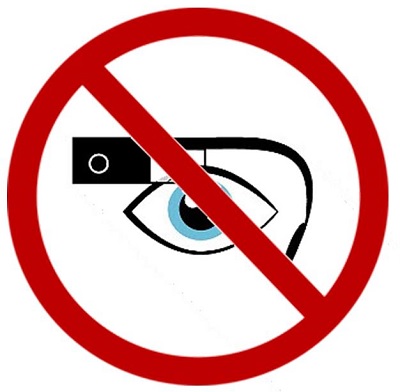Denny |
September 11, 2014
New anti-router gadgets are working to block augmented reality glasses, cameras, and drones from connecting.
There is a growing number of people who are feeling uneasy about the presence of security cameras, drones, and Google Glass wearers, among other types of device, that could be recording video or audio of them without their knowledge or permission.
In response to this discomfort with the technology, devices are being developed to stop those devices from getting online.
Among these devices, one that is currently receiving a considerable amount of attention is the Cyborg Unplug. All that a user needs to do is to plug it into an electrical socket. From that point on, if a Google Glass device or some other form of surveillance gadget should try to connect to WiFi within the vicinity, it will sound an alarm
Moreover, that gadget can also stop Google Glass and other devices from connecting to a WiFi network.
 When plugged in at home for example, the Cyborg Unplug will stop surveillance devices from being able to connect to the owners WiFi network. Essentially, the device is a very small sized router that contains firmware that is built to be able to identify and stop devices based on their MAC addresses.
When plugged in at home for example, the Cyborg Unplug will stop surveillance devices from being able to connect to the owners WiFi network. Essentially, the device is a very small sized router that contains firmware that is built to be able to identify and stop devices based on their MAC addresses.
This particular mobile gadget was developed by an artist who resides in Berlin, named Julian Oliver. He came up with a bit of code that was called Glasshole.sh which was created specifically to stop wearers of Google’s augmented reality headsets from being able to connect to a WiFi network. The concept was popular enough that Oliver felt justified in developing a complete consumer product that was designed for that same purpose.
On the official website for the product, Oliver points out that when the Cyborg Unplug is in its “All Out Mode,” – which is the setting that stops Google Glass and surveillance devices from making a connection with any WiFi located in the area, the use of the device is actually not legal in many areas, and he advises against its use in that way. That said, with the option available, it would not be unimaginable for consumers to choose to break the law in order to try to protect their privacy…or more realistically, for activists to slip these very small sized devices into public places with hot spots, in order to cause some chaos.
BWild |
September 2, 2014
Retailers now have new regulations to which they must adhere with location based marketing.
When it comes to mobile marketing, geolocation has provided advertisers with an unparalleled opportunity to understand their customers and communicate with them at the perfect moment in the shopping experience.
Location based marketing does involve the collection of a customer’s position, of which a privacy watchdog is highly aware.
In France, a privacy watchdog has looked into the use of geolocation technology as a marketing method and has now implemented limitations for retailers and tracking companies with regards to what they are permitted to do. The goal of these restrictions is to help to protect the privacy of smartphone carrying customers. While the Commission National de l’Informatique et des Libertés (CNIL) says that it is trying to keep private data safe, at the same time, many French retailers now feel as though they have had all of their opportunity for this technology cut off.
The geolocation rules that have been drafted by the CNIL provide strict guidelines regarding what can be tracked.
 Some retailers feel that their ability to use location based marketing through geolocation has been nullified by the CNIL rules. The idea behind this type of mobile marketing is to track the movement of consumers throughout a brick and mortar location, or to know when a customer has approached a store so that advertising and promotions can be sent to them at the moment that they are most receptive to information about deals, opportunities, products, or brands.
Some retailers feel that their ability to use location based marketing through geolocation has been nullified by the CNIL rules. The idea behind this type of mobile marketing is to track the movement of consumers throughout a brick and mortar location, or to know when a customer has approached a store so that advertising and promotions can be sent to them at the moment that they are most receptive to information about deals, opportunities, products, or brands.
This type of tracking can also provide a mobile advertising firm or a retailer with the route that customers take while they are within a store as well as the length of time that they spend viewing a specific ad. With this information, advertisers can change their strategies to better appeal to consumers because the information and offers that they provide will be more interesting and relevant to the people who are actually shopping.
However, the privacy watchdog feels that the type of data collection through geolocation places the customer’s privacy and mobile security at risk. It has demanded that if these techniques are used by a retailer, that company must first report this to a special committee and also inform their customers of the techniques being used and the purposes for which the data is being collected. Moreover, as soon as the customer has left the store, any individual data must be deleted. No camera images can be collected and stored and none can be passed to a third party.
 When plugged in at home for example, the Cyborg Unplug will stop surveillance devices from being able to connect to the owners WiFi network. Essentially, the device is a very small sized router that contains firmware that is built to be able to identify and stop devices based on their MAC addresses.
When plugged in at home for example, the Cyborg Unplug will stop surveillance devices from being able to connect to the owners WiFi network. Essentially, the device is a very small sized router that contains firmware that is built to be able to identify and stop devices based on their MAC addresses.
 Some retailers feel that their ability to use location based marketing through geolocation has been nullified by the CNIL rules. The idea behind this type of mobile marketing is to track the movement of consumers throughout a brick and mortar location, or to know when a customer has approached a store so that advertising and promotions can be sent to them at the moment that they are most receptive to information about deals, opportunities, products, or brands.
Some retailers feel that their ability to use location based marketing through geolocation has been nullified by the CNIL rules. The idea behind this type of mobile marketing is to track the movement of consumers throughout a brick and mortar location, or to know when a customer has approached a store so that advertising and promotions can be sent to them at the moment that they are most receptive to information about deals, opportunities, products, or brands.